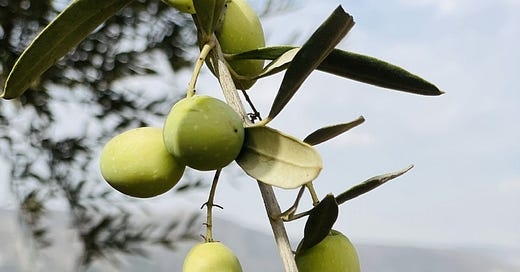Olive farming in times of war
Amid rising tensions, Samer Hasbany is forced to find new ways to maintain his family olive business in southern Lebanon
Samer Hasbany is always looking for ways to diversify his family's olive business. That’s how you survive in Lebanon, where unpredictable circumstances make it difficult to plan ahead. The farm, which spreads across the hillsides outside the southern Lebanese town of Deir Mimas, hosts some of the oldest olive trees in Lebanon, with one dating back over 2,000 years.
When Hasbany’s father took over from his father in the nineties, he expanded the orchards, planting 100 new olive trees when each of his children was born. Today, the farm supports Hasbany and his three sisters, who work together to sustain it through difficult times.
The latest challenge is a big one. Rocket and missile attacks from Israel, just five kilometers across the border, have damaged some of the orchards, potentially contaminating the soil. If toxic chemicals are found when the land is tested later in the season, Hasbany will be unable to sell his award-winning olive oil. “I’m not sure what we can do. This is our family heritage, but we don’t have a clear vision of the future right now.”
Since quitting his job in insurance in 2018 to focus on the family business full-time, he has found ways to survive in Lebanon’s turbulent economic climate. He had already overseen an expansion into olive oil in 2015 to make use of the olive glut each year. Now, he plans to use the waste product from their oil production to create olive logs, which can be burnt for fuel, creating a sustainable alternative to wood.
An Innovation Hub grant from Ideas Beyond Borders will help him purchase equipment, including stainless steel silos and tanks, to store the olive oil and waste products before it is turned into olive logs. He will then sell the logs in local villages, where traditionally, they cut trees from the forest to burn all winter. “There are a lot of small businesses in Lebanon looking for support to sustain their productivity and confront the challenges. This grant is an opportunity to push forward and get the new equipment,” Hasbany says.
He is hoping they will be able to collect their olive groves come harvest time in September. Last year, it took a month to get all the olives in because pickers were afraid to be out in the fields as political tensions rose. “We have to stay positive as much as we can to move forward. I’m trying to focus on my work and to sustain myself and my family,” Hasbany says.
It’s not the first time the farm has survived times of turmoil. In 2006, the orchards were damaged, and their soil was contaminated by chemicals during the war with Israel. It took seven years to recover to a level where they could sell the olives once more. That’s when Hasbany decided to expand into olive oil, creating an award-winning product that won the silver medal at the Dubai Olive Oil competition in 2023, surpassing contestants from all over the world.
“The international standard for olive oil to be classified as extra virgin requires it to be under 0.8 percent acidity. Ours is under 0.1 percent,” says Hasbany, describing the flavor as “pungent and nutty with green tomato notes."
As he waits to learn whether the upcoming yield is contaminated, Hasbany is busy building up the olive logs arm of the business, which does not require the same level of soil purity. With the family dependent on his success, he is determined to find a way to sustain the orchards and maintain some form of production. “Even if the land is contaminated, I can still sell the logs. If we can get the olives in, that is,” he adds.
This article was written by Olivia Cuthbert.






The tragedy of this is that just a few kilometers away there will be Israeli olive farmers who'd love to swap ideas and share their skills. This would truly be ideas beyond borders.